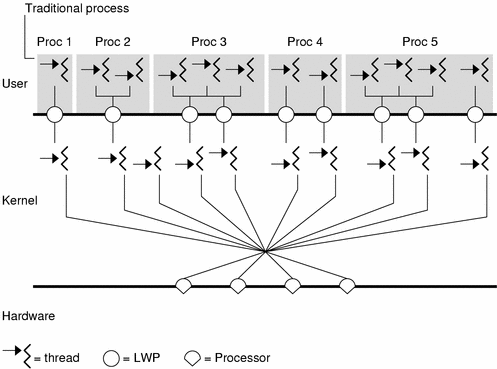Lightweight Processes
Figure 9–1illustrates the relationship between LWPs and the user and kernel levels.
Figure 9–1 Multithreading Levels and Relationships

The user-level threads library ensures that the number of LWPs available is adequate for the currently active user-level threads. The operating environment decides which LWP should run on which processor and when. It has no knowledge about user threads. The kernel schedules LWPs onto CPU resources according to their scheduling classes and priorities.
Each LWP is independently dispatched by the kernel, performs independent system calls, incurs independent page faults, and runs in parallel on a multiprocessor system.
An LWP has some capabilities that are not exported directly to threads, such as a special scheduling class.
The new threads library introduced in Solaris 9 actually assigns one LWP to every thread. This is the same as the alternate libthread in Solaris 8.
The new implementation solves many problems that were inherent in the design of the old threads library, principally in the areas of signal handling and concurrency. The new threads library does not have to be told the desired degree of concurrency via thr_setconcurrency(3THR) because every thread executes on an LWP.
In future Solaris releases, the threads library might reintroduce multiplexing of unbound threads over LWPs, but with the constraints currently in effect for Solaris 9:
-
all runnable threads are attached to LWPs
-
no hidden threads are created by the library itself
-
a multithreaded process with only one thread has semantics identical to the semantics of a traditional single threaded process.
- © 2010, Oracle Corporation and/or its affiliates
